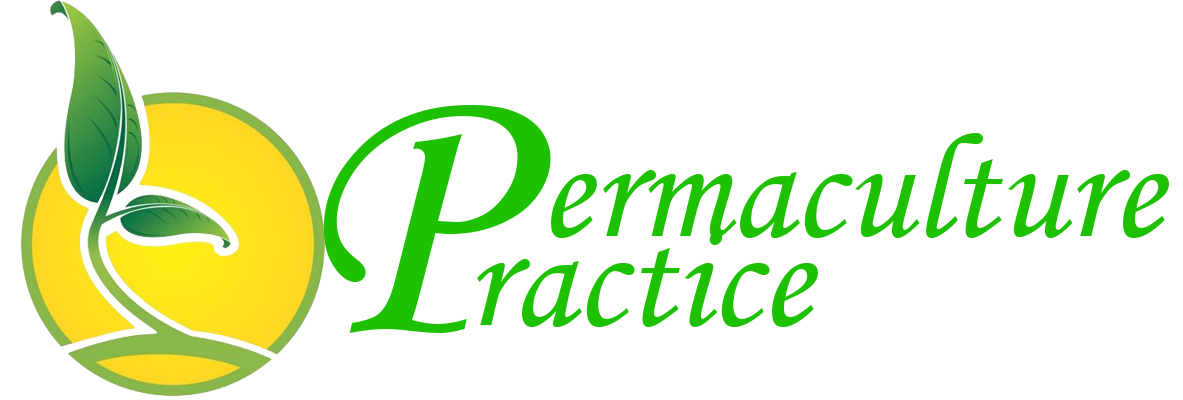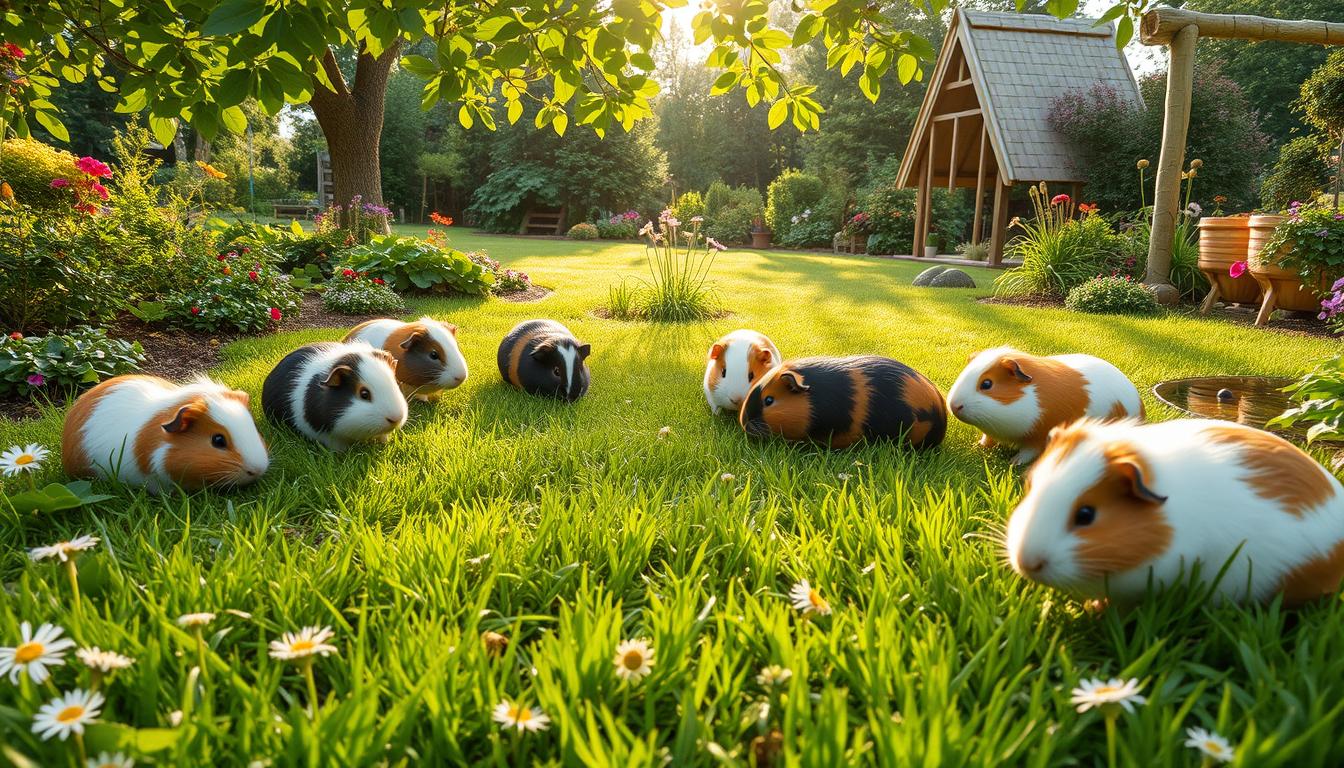Did you know that the first mechanical lawn mower was invented in 1827 and patented in 1830? Before this revolutionary invention, lawns were traditionally kept short by grazing livestock in Europe during the 17th century. In fact, lawns were originally a symbol of wealth and status, as only the wealthy could afford the labor-intensive maintenance required to maintain these carefully manicured spaces.
Today, many lawns are still maintained in unsustainable ways, such as mowing very short, disposing of clippings, and using chemical fertilizers and herbicides. This leads to soil depletion and environmental contamination. However, by incorporating Guinea Pigs in Permaculture systems, you can achieve a more eco-friendly and sustainable approach to lawn maintenance while also introducing a unique source of Cavy Manure as a valuable Natural Fertilizer. Additionally, guinea pigs can serve as Companion Animals and contribute to a Closed-Loop System by recycling Food Scraps and Bedding Materials.
Throughout this article, we’ll explore the numerous benefits of integrating Guinea Pigs in Permaculture systems, including Eco-friendly Lawn Maintenance, Pest Control, Companion Planting, and Organic Farming. Whether you’re a seasoned permaculture enthusiast or just starting to embrace sustainable gardening practices, Guinea Pigs in Permaculture can be a valuable addition to your Low-Maintenance Livestock and Sustainable Gardening efforts.
Benefits of Guinea Pigs in Permaculture Systems
In permaculture, harnessing the power of nature is key to creating sustainable and productive systems. One such example is the integration of guinea pigs into the permaculture garden. These furry companions offer a multitude of benefits that can significantly enhance the overall ecosystem.
Eco-friendly Lawn Maintenance
Guinea pigs are excellent natural lawn mowers, allowing you to reduce the need for energy-intensive and polluting gas-powered lawn mowers. As they graze on the grass, they help to maintain a healthy, well-manicured lawn without the environmental impact of traditional lawn care methods. Utilizing biological resources like guinea pigs is a key principle in permaculture design.
Recycling Food Scraps and Bedding Materials
Guinea pigs can contribute to a closed-loop system by recycling food scraps and bedding materials. Their nutrient-rich manure, known as cavy manure, can be composted and used as a valuable natural fertilizer for your garden, completing the cycle of organic matter and nutrients. Designing a permaculture garden with guinea pigs in mind can help create a thriving, self-sustaining ecosystem.
“Integrating guinea pigs into your permaculture system allows you to create a sustainable, closed-loop cycle of resource management and nutrient cycling.”
Preparing for Guinea Pigs in Your Garden
Before introducing guinea pigs to your permaculture system, it’s crucial to ensure their living environment and nutritional needs are properly addressed. These furry companions require a spacious and well-ventilated guinea pig housing setup, complete with ample space for movement and hiding areas.
Housing and Enclosure Requirements
Guinea pigs thrive in large, open enclosures that provide them with room to explore and play. The enclosure should be constructed with durable, chew-proof materials and offer a variety of hiding spots for their natural burrowing instincts. Proper ventilation is essential to maintain a healthy environment and prevent respiratory issues.
Providing Proper Nutrition
Ensuring your guinea pigs receive a balanced and varied guinea pig nutrition is crucial for their overall well-being. A diet rich in fresh grasses, vegetables, and high-quality hay is recommended. Supplementing their meals with vitamin C-rich foods, such as bell peppers or kiwi, can help prevent common health problems. Maintaining a consistent feeding schedule and providing clean, fresh water at all times are also essential for your guinea pigs’ sustainable gardening in your permaculture system.
“Proper housing and nutrition are the foundation for keeping guinea pigs healthy and happy in your permaculture garden.”
By addressing these essential requirements, you’ll be well on your way to successfully integrating your furry companions into your sustainable gardening practices, creating a harmonious and thriving permaculture system.
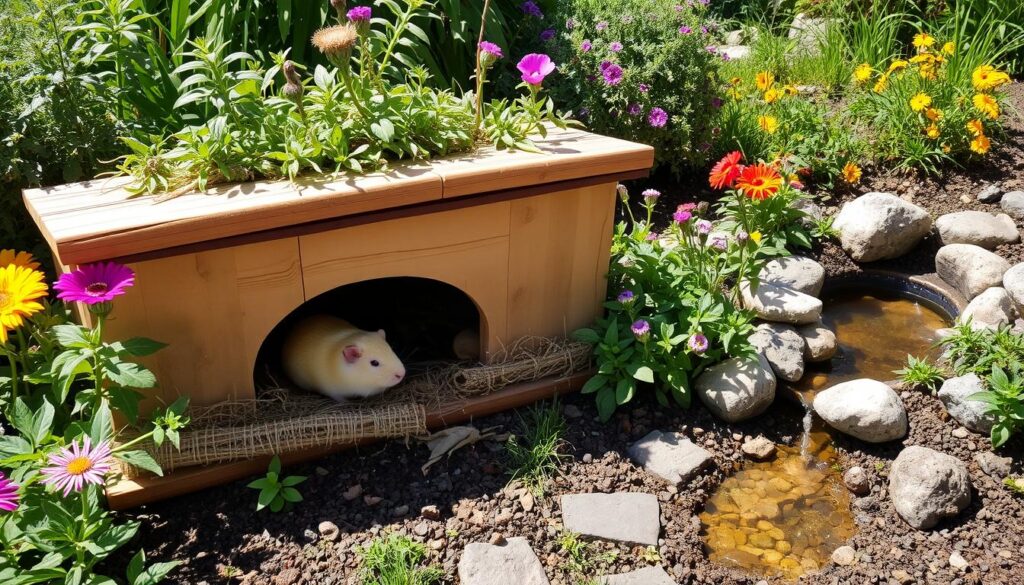
Guinea Pigs as Companion Animals
In addition to their practical roles in a permaculture system, guinea pigs can also serve as engaging and rewarding companion animals. Their friendly and gentle nature makes them popular pets, particularly for families and individuals seeking a low-maintenance livestock option. Caring for guinea pigs can provide a sense of responsibility and connection to the natural world, fostering a deeper appreciation for the role of animals in sustainable living.
Adult cavies typically weigh between 700g and 1.2 kg, with meat breed cavies often producing litters ranging from 2 to 6 pups. These social creatures thrive in groups, with a recommended ratio of one boar per three to five sows for effective breeding. Guinea pigs can have up to 5 litters per year, with an average of 3 pups per litter, making them a low-maintenance livestock option for homesteads and urban gardens.
Aside from their practical applications, guinea pigs can also provide companionship and enjoyment as pets. Their diverse range of colors and patterns, from black and brown to beige, white, and speckled, make them visually appealing additions to any home. Guinea pigs are known for their social nature and can thrive when kept in small groups, fostering a sense of community and enrichment for their caretakers.
Introducing Guinea Pigs to Your Permaculture System
When integrating guinea pigs into your permaculture system, it’s crucial to consider how they will interact with other garden elements. Thoughtful placement of their enclosure near vegetable beds or orchards can allow these gentle herbivores to contribute to the overall productivity of your system.
Integrating with Other Garden Elements
By strategically positioning the guinea pigs’ housing, you can leverage their natural behaviors to benefit your permaculture design. For instance, placing their enclosure adjacent to your vegetable patch or fruit trees enables them to graze on excess greens and fallen produce, effectively recycling valuable nutrients back into the soil.
Managing Potential Pests and Predators
While Integrating Guinea Pigs into your permaculture system offers numerous advantages, it’s essential to address potential Pest Control and Predator Management concerns. Secure and predator-proof housing, coupled with strategic placement within the garden, can help ensure the safety and well-being of your guinea pigs, as well as the overall health of your permaculture ecosystem.
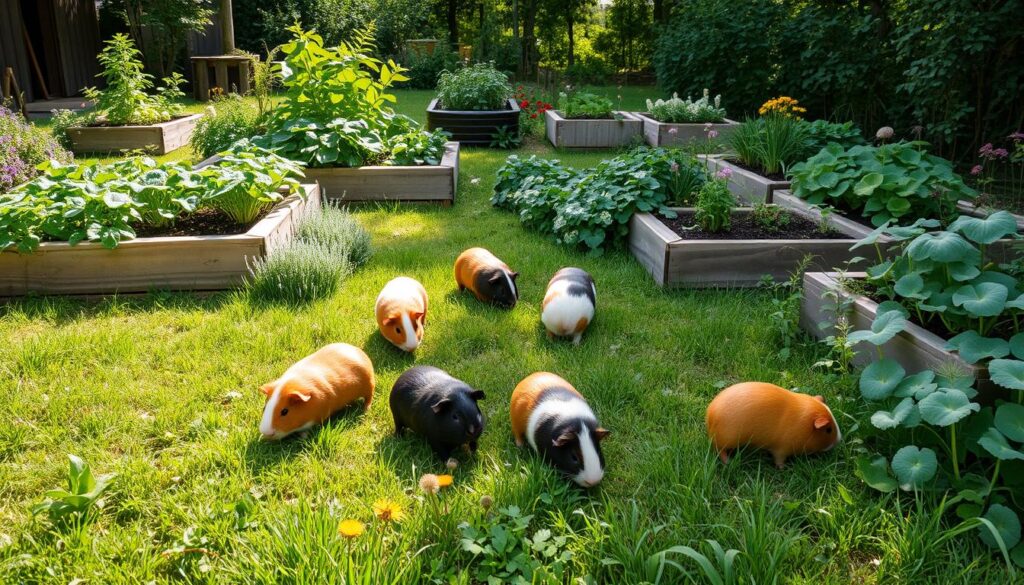
“Livestock integration in food forests can reduce labor and fossil fuel needs, with animals performing diverse functions like site preparation, tillage, mowing, grazing, insect control, weeding, and picking up drops.”
By carefully considering the integration of guinea pigs into your permaculture system, you can unlock their full potential as eco-friendly lawn mowers, natural recyclers, and companions that enhance the overall productivity and sustainability of your garden.
Guinea Pigs in Permaculture
Guinea pigs can play a vital role in a permaculture system, contributing to the overall sustainability and productivity of the garden. Their unique characteristics, such as their ability to graze on grass and recycle organic matter, make them an excellent choice for integration into a closed-loop, regenerative design. By understanding the multifaceted benefits of including guinea pigs in your permaculture system, you can create a thriving, self-sustaining ecosystem.
Over the past 19 years, a guinea pig population has grown to over forty animals within three enclosures at Bungala Ridge Permaculture Gardens. These guinea pigs in permaculture systems can consume three times their body weight in green plant matter daily, producing significant amounts of manure, making them efficient at fertilizing the garden.
“Guinea pig meat is considered a delicacy in some Australian restaurants, showcasing a potential market for this product.”
Moreover, guinea pigs require no extra food beyond fruit and vegetable scraps, wheat screenings, and garden weeds, emphasizing their low maintenance and cost-effective care. They can eat up to 5 times their own weight in green stuff each day, highlighting their ability to contribute to mowing grass and controlling vegetation in specific areas.
Additionally, guinea pigs are known to be voracious grass eaters, making them effective for grass management in permaculture systems. Their manure is a cold fertilizer rich in nutrients, suitable for enriching garden soil without composting. The cost and effort required to maintain guinea pigs in a permaculture system are relatively low, making them an accessible option for practitioners.
Cavy Manure: A Valuable Natural Fertilizer
One of the most significant contributions of guinea pigs in a permaculture system is their nutrient-rich manure, known as cavy manure. This natural fertilizer can be composted and applied to your garden, providing essential nutrients for your plants and improving soil health. The closed-loop cycling of organic matter, facilitated by the presence of guinea pigs, is a cornerstone of sustainable and organic farming practices.
Cavy manure is similar to rabbit dung, containing valuable nutrients like nitrogen and phosphorus. It can be safely used in the garden and is suitable for home composting. The process of composting guinea pig waste requires mixing it with straw and other compostable items, allowing it to sit for at least six months before using it on your plants.
For a more immediate solution, you can create a guinea pig manure tea by soaking guinea pig pellets in water, allowing the mixture to sit overnight, and then straining the liquid for use as a natural fertilizer in your garden. This liquid fertilizer can provide a quick nutrient boost for your plants.
By incorporating cavy manure into your permaculture system, you can enjoy the benefits of a nutrient-rich, organic farming approach, supporting the overall health and productivity of your garden.
Sustainable Guinea Pig Care and Husbandry
Ensuring the long-term well-being of your guinea pigs is crucial for maintaining a successful permaculture system. When it comes to Sustainable Guinea Pig Care, carefully selecting the appropriate Guinea Pig Breeds based on your specific needs and providing them with suitable Guinea Pig Housing and Nutrition are essential for their health and longevity.
Choosing the Right Breed
Wild guinea pigs are social animals, leading to a preference for companionship in domestic settings, where a male-dominated hierarchy exists, which influences pet behavior and requirements for social interaction. With a diverse range of Guinea Pig Breeds available, it’s essential to research and choose the ones that best fit your permaculture setup and individual needs.
Meeting Housing and Dietary Needs
Providing your guinea pigs with the right Guinea Pig Housing and Nutrition is crucial for their well-being. Inappropriate bedding materials like cedar shavings and pine shavings are considered unsafe due to health risks and should be avoided. Instead, opt for more suitable options that ensure a comfortable living environment and adequate mobility. Additionally, a guinea pig’s strict vegetarian diet requires a nutritional balance of grass hay, fresh vegetables, fruits, and vitamin C supplements to maintain optimal health and prevent deficiencies.
“Monitoring the signs of a healthy guinea pig, such as activity levels, eating habits, stool consistency, fur condition, and communication patterns, is essential to ensure their well-being.”
By prioritizing sustainable Sustainable Guinea Pig Care practices, you can ensure that your guinea pigs continue to thrive and contribute to the overall productivity of your permaculture garden.
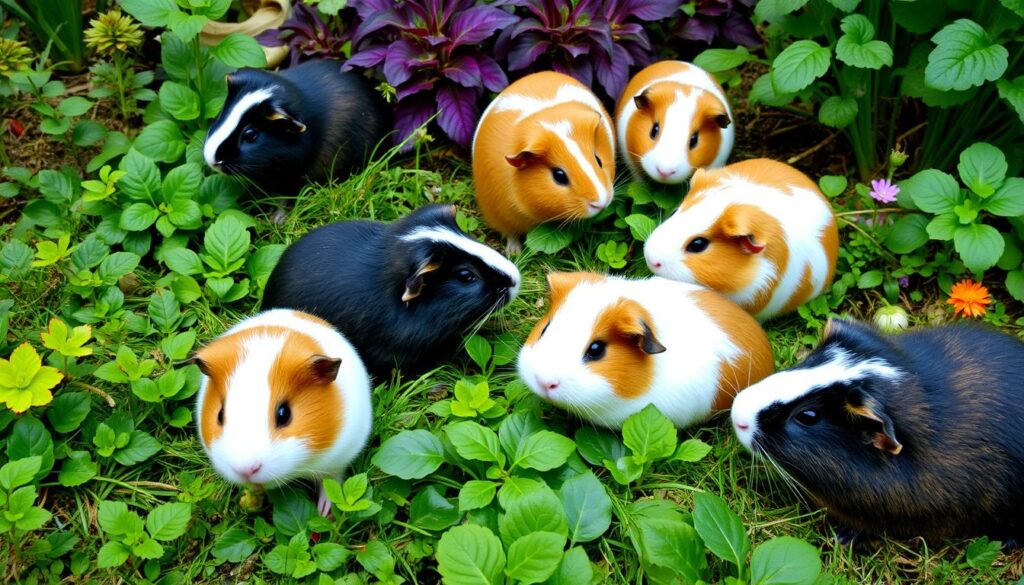
Companion Planting with Guinea Pigs
In the world of permaculture, Guinea pigs can play a vital role in companion planting – a technique that harnesses the natural relationships between plants to enhance growth, deter pests, and promote overall ecosystem health. By carefully integrating your guinea pigs into your garden, you can create a symbiotic relationship that benefits the entire permaculture system, reducing the need for synthetic pesticides and supporting organic farming practices.
Guinea pigs, with their natural grazing habits, can act as eco-friendly lawn mowers, maintaining the perfect height for your companion plants. Their constant nibbling and moving through the garden can also help to aerate the soil and disrupt the life cycle of common garden pests, providing Pest Control without the use of harmful chemicals.
Moreover, guinea pigs’ unique dietary preferences can complement the growth of certain plants. For instance, they tend to avoid many aromatic herbs, such as lavender, rosemary, and thyme, which can be strategically planted around your vegetable beds to deter unwanted insects. Companion Planting with guinea pigs can also help to improve soil fertility, as their nutrient-rich manure can be directly applied to the garden, contributing to the overall Organic Farming ecosystem.
“By harnessing the natural relationships between plants and animals, we can create a thriving, self-sustaining permaculture system that benefits both the environment and our own food production.”
Integrating guinea pigs into your permaculture design requires careful planning and observation, but the rewards can be bountiful. With their unique behaviors and dietary preferences, these furry companions can become valuable assets in your journey towards a more sustainable, Organic Farming future.
Closed-Loop Systems: Guinea Pigs and Waste Recycling
In the pursuit of sustainable permaculture, the integration of guinea pigs can contribute to the creation of a closed-loop ecosystem. By recycling food scraps and bedding materials, the guinea pigs’ manure can be composted and returned to the soil, completing the cycle of organic matter and nutrients. This closed-loop approach reduces waste, minimizes the reliance on external inputs, and fosters a self-sustaining, resilient permaculture design.
The concept of closed-loop systems is exemplified by the Chai Tent at the Australian Permaculture Convergence in 2023, which became a social space for mending clothes and sharing skills, indicating a cultural shift towards valuing repair and reducing waste. This trend highlights the growing awareness of the need to reduce our reliance on mass-produced, disposable items and instead embrace a more sustainable approach to resource utilization.
“The reuse of rice straw for various purposes, such as protecting gardens, drying produce, and providing bedding and supplementary feed for animals, showcases a sustainable approach to resource utilization.”
By incorporating guinea pigs into a permaculture system, gardeners can not only maintain their lawn in an eco-friendly manner but also contribute to a closed-loop cycle of waste recycling. The guinea pigs’ manure, combined with the bedding materials, can be composted and returned to the soil, providing valuable nutrients for plant growth. This symbiotic relationship between the guinea pigs and the garden creates a self-sustaining ecosystem, reducing the need for external inputs and minimizing waste.
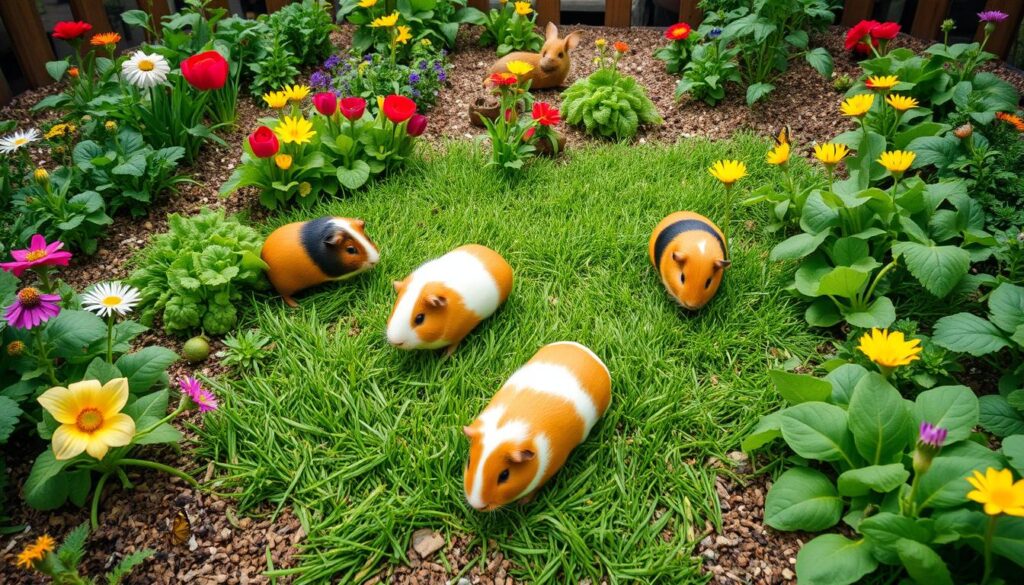
The benefits of this closed-loop approach go beyond just the garden. By reducing waste and promoting sustainable practices, permaculture systems that integrate guinea pigs can contribute to a more holistic and resilient approach to food production and resource management. This model showcases the potential for small-scale farming to play a significant role in addressing global sustainability challenges.
Pest Control with Guinea Pigs in Permaculture Gardens
In a permaculture garden, guinea pigs can serve as natural and effective pest control agents. Their grazing habits and interactions with the surrounding plants can help deter and manage various garden pests, reducing the need for chemical pesticides. By leveraging the role of guinea pigs in your permaculture system, you can promote a balanced, organic approach to Pest Control, contributing to the overall health and vitality of your garden.
Guinea pigs are known to graze on a wide variety of plants, including many common garden weeds and unwanted vegetation. This selective feeding behavior can help suppress the growth of invasive plants and control the spread of certain pests. Additionally, the presence of guinea pigs in your garden can encourage the growth of Companion Planting species that deter specific insect pests through their natural repellent properties.
Moreover, guinea pigs’ waste can be a valuable asset in your Organic Pest Management strategy. Their nutrient-rich manure can be used as a natural fertilizer, improving soil fertility and promoting the overall health of your plants, which in turn can increase their resistance to pests and diseases.
“By incorporating guinea pigs into your permaculture garden, you can create a self-sustaining, closed-loop system that efficiently manages pests and produces valuable organic matter for your plants.”
Integrating guinea pigs into your permaculture garden requires careful planning and consideration of their housing, nutritional, and behavioral needs. However, the long-term benefits of this approach, including reduced reliance on synthetic pesticides and a more resilient, balanced ecosystem, make it a worthwhile investment for the conscientious gardener.
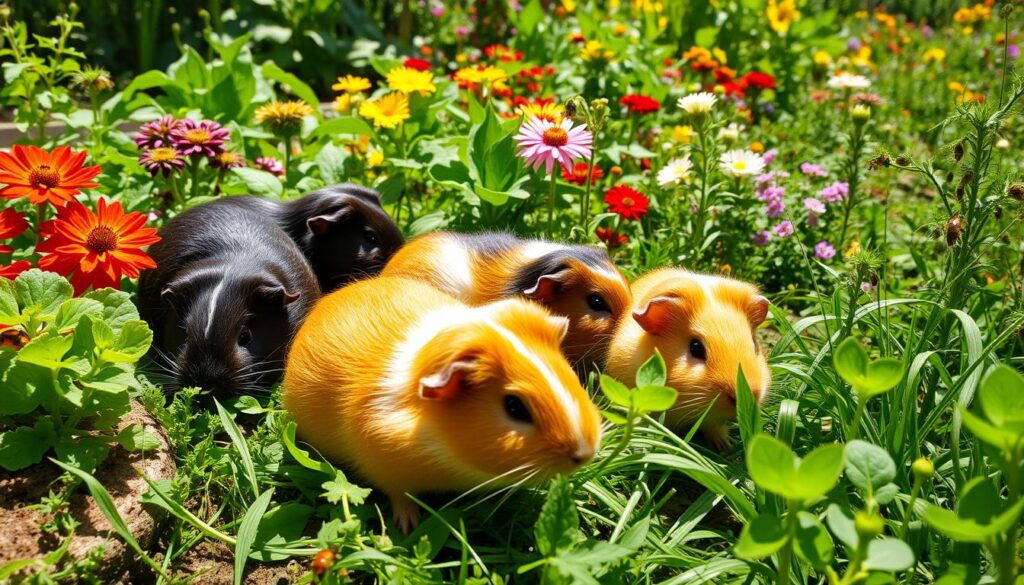
By harnessing the natural pest control abilities of guinea pigs, you can create a thriving, Organic Pest Management system in your permaculture garden, promoting the overall health and sustainability of your growing environment.
Low-Maintenance Livestock: Guinea Pigs in Urban Settings
When it comes to introducing livestock into urban permaculture systems, guinea pigs stand out as a practical and sustainable choice. Their relatively low-maintenance requirements and adaptability to smaller living spaces make them an excellent option for city-dwellers and those with limited acreage.
Unlike chickens, which are often considered the most popular low-maintenance livestock due to their diet and ease of care, guinea pigs offer a unique set of benefits. They are quieter and more social than rabbits, making them a preferred option in urban areas. While Angora rabbits offer advantages in terms of manure, meat, and high-quality fiber, their fur maintenance can be challenging, making guinea pigs a more manageable alternative.
Providing fresh hay, herbs, and vegetables for urban livestock like guinea pigs is emphasized over canned or dry foods, which often come from factory-farmed animals. This approach not only promotes a more ethical and sustainable food source but also aligns with the principles of Urban Permaculture and Small-Scale Farming.
“Guinea pigs, along with rabbits, are not allowed in Queensland, indicating a restriction on these animals in the region.”
Despite such restrictions, guinea pigs continue to be a popular choice for Low-Maintenance Livestock in urban settings. Their social nature, friendly disposition, and low-impact on the soil make them an ideal addition to permaculture systems. By incorporating guinea pigs into your urban garden, you can enjoy the benefits of livestock-based systems while navigating the challenges of limited space and resources.
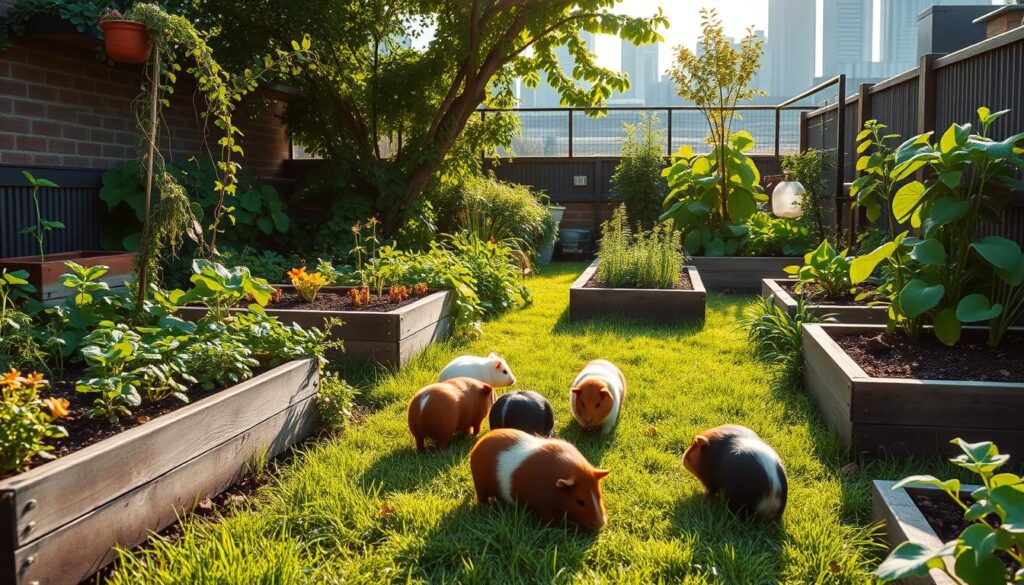
Organic Farming with Guinea Pigs: A Sustainable Approach
The integration of guinea pigs into a permaculture system aligns seamlessly with the principles of Organic Farming. By utilizing their nutrient-rich Cavy Manure as a Natural Fertilizer, you can build healthy, fertile soil without relying on synthetic chemicals. This Sustainable Agriculture approach not only benefits the plants and wildlife in your garden but also contributes to the overall environmental and human health. Embracing guinea pigs as part of your organic farming practices can help create a thriving, self-sustaining ecosystem.
Guinea pigs, also known as cavies, are the perfect companions in an organic permaculture setting. Their manure is an excellent source of nitrogen, phosphorus, and potassium, providing a balanced and nutrient-dense fertilizer for your plants. Integrating guinea pigs into your garden allows you to recycle food scraps and bedding materials, reducing waste and promoting a closed-loop system.
“Cavy manure is a valuable asset in organic farming, as it helps to enrich the soil with essential nutrients without the use of harsh chemicals.”
By incorporating guinea pigs into your Organic Farming practices, you can create a sustainable and self-sufficient ecosystem. Their manure not only nourishes the soil but also supports the growth of a diverse range of plants, fostering a healthy and thriving permaculture garden.
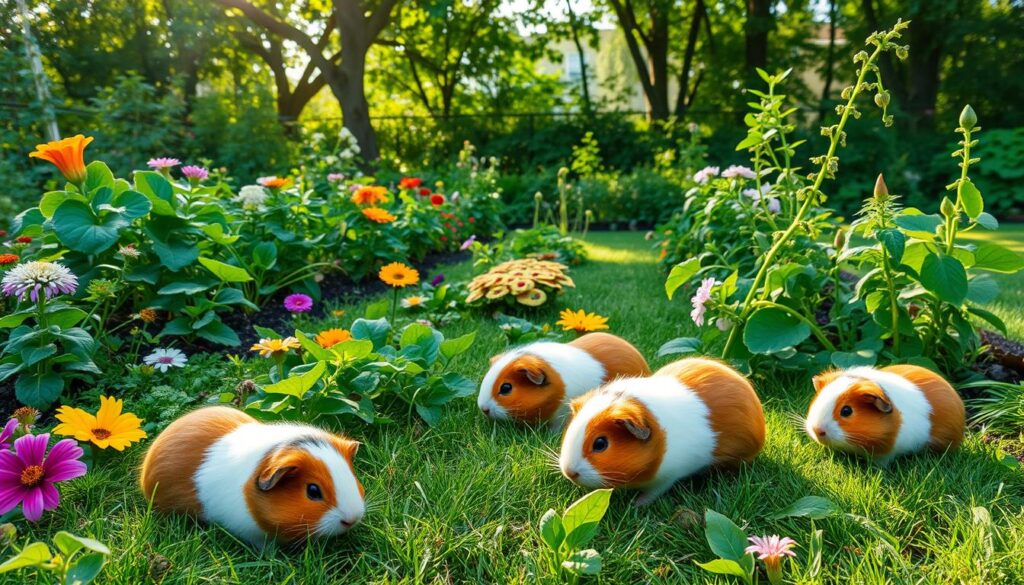
Embracing Organic Farming with guinea pigs allows you to minimize your reliance on external inputs and move towards a more closed-loop system. This approach not only benefits the environment but also enhances the overall resilience and productivity of your permaculture garden, contributing to a more Sustainable Agriculture model.
Conclusion
Guinea pigs can be a valuable addition to a Permaculture system, offering a range of benefits that contribute to the overall health and productivity of your garden. From their role as natural lawn mowers and composters to their potential as companion animals and pest control agents, these versatile creatures can help create a self-sustaining, closed-loop ecosystem. By carefully incorporating guinea pigs into your Permaculture design and prioritizing their well-being, you can unlock the full potential of these animals as integral components of a thriving, sustainable landscape.
The integration of guinea pigs in a Permaculture setting requires a deep understanding of their specific needs and behaviors, as well as a systematic approach to observing their impact on the farm. Careful planning, research, and adaptability are key to ensuring a harmonious coexistence between guinea pigs and the other elements of your Permaculture system. By following the principles of Permaculture and prioritizing the ethical treatment of these animals, you can create a resilient, self-sustaining ecosystem that benefits both the environment and the livestock.
As Permaculture continues to evolve and expand, the role of guinea pigs and other livestock in sustainable gardening practices will likely become increasingly recognized and embraced. By incorporating these versatile creatures into your Permaculture design, you can contribute to the creation of a more sustainable, regenerative, and compassionate future for both people and the planet.
